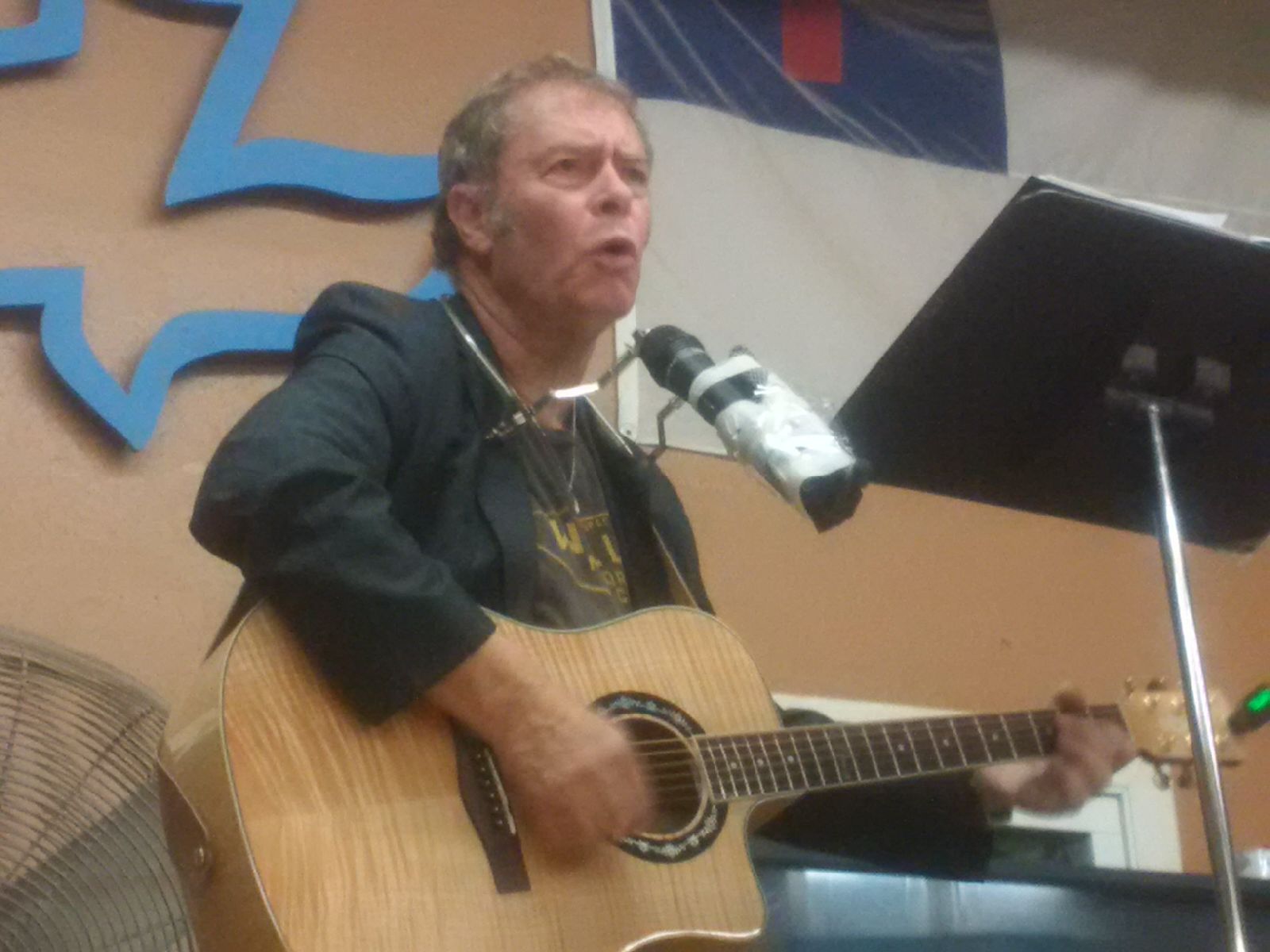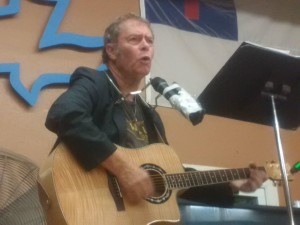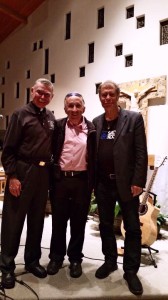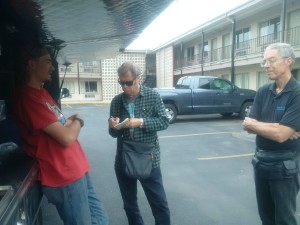By Jeremy Reynalds, Ph.D.
Founder and CEO
Joy Junction Inc.
Garth Hewitt has a passion for those routinely ignored by the rest of the world.
I fell in love with this delightfully ever so English Anglican priest’s music while still in England in the late 1970’s.
Even back then, it had a soul piercing quality often not present in some Christian music.
However, I never met him in person while I still lived in England. It wasn’t until (about) the early 1990’s, that while on a short tour of the States Garth agreed to do a concert for our guests at Joy Junction. They loved his music and spirit as much as I did.
A few more concerts over the following years occurred and while Garth didn’t make it back to Joy Junction for a number of years, I kept track of his career and we also kept in contact by email and with an occasional phone call.
During those years, Garth was continuing his worldwide ministry of telling the stories musically of those who had no one else to speak for them.
His music challenged and encouraged me and played a major part in helping me change my philosophy of life.
As I told Rick Nathanson of the Albuquerque Journal for a recent story, “I’m much less judgmental than I used to be and that’s made me a much happier person. My mantra for the last eight or nine years is ‘Let God do the judging, and I will do the loving.’ ”
I was so happy to reconnect with Garth and his wife Gill for a concert in mid 2015. While in Albuquerque, Garth sang at Joy Junction, as well as at the Prince of Peace Catholic Parish pastored by my good friend Father Mike Shea.
He also saw our mobile feeding unit the Lifeline of Hope in action, and was inspired to write a poignant song which we have used to accompany a short video highlighting our 30 year anniversary.
But a little more about Garth.
Beginnings
Garth has been in music ministry for over 45 years. He was ordained a deacon in 1969 in Canterbury Cathedral by Archbishop Michael Ramsey, and as a priest in 1970.
In a 2015 email interview, Garth said the Archbishop was very supportive of his music. After serving a three year stint as a curate (assistant priest) in Maidstone, he was then invited by an Anglican organization to go full time with his music. That resulted in him traveling around the country doing concerts.
At one point, I told Garth, he seemed to be more of a “traditional” Christian singer. I asked him what was the motivation for his switch to songs and a ministry of social justice to the oppressed and marginalized.
Garth said that while it may have seemed in the 1970’s he was more traditional, even back then he was trying to talk about issues of social justice in each album.
A new passion
Garth said this new passion resulted after hearing Martin Luther King speak in St. Paul’s Cathedral on his way to pick up the Nobel Peace Prize a few years earlier. From that point on, Garth said, he was always trying to work out the implications of what he had said and to bring it into his music.
This became particularly clear in early 1980, Garth said, with the release of the album “Record of the Weak.” It was then followed up by “Road to Freedom.”
“Both albums focused on a much clearer and articulate commitment to the gospel mandate to justice, and to the poor and the oppressed.”
Garth added, “Going to India around then and meeting with Mother Theresa, and also going to Uganda at a very violent and difficult time, and to Haiti and seeing the quantity of poverty that existed made me aware of my vocation to sing about these issues.”
I wondered how Garth’s English fans reacted to was a pretty overt change in his ministry style.
A commitment to justice and the poor
Garth said he did a presentation at the Greenbelt Festival after the release of “Road to Freedom,” which was called “Nero’s watching Video.”
“It was an outright commitment to justice and the poor. Some people did walk out of the event, but most stayed with me. I have been very fortunate in the support I have received from both leaders in the Church and those who enjoyed my music. Those who stayed with me went on a journey of increasing commitment to justice issues.”
I asked Garth what he hoped to see accomplished through his work.
He said it is the work of Christians to make visible the Kingdom of God and bring a revolution of love into the world. He continued, “I hope I play a part in helping to open people’s eyes to this responsibility.”
Almost reflectively he added, “I think Jesus was very political He talked about bringing in the Kingdom of God. This was a deliberate challenge to the kingdoms and empires of the world.”
I asked Garth what was a high point of his ministry. He said when he writes a song, takes it back to the people for whom it was written and watches their reaction.
“I always do that to test if it has been faithful to their situation, and I am deeply moved when I see what it means to them. It is saying to them they are not forgotten, and God has not forgotten them.”
The next question was an obvious follow up. What was his lowest ministry point? He said, “I am sad that songs I wrote 25 years ago about the situation in Palestine and Israel are still as relevant today as they were then. Nothing has been resolved. The world still ignores Palestine, and I feel a deep sadness that they are constantly ignored.”
He said the most tragic thing about the Arab-Israeli conflict is the situation in Gaza. “Israel is conducting a medieval siege against this community of refugees and young people. Gaza shames the world; not only Israel but also Egypt, the European Union and the United States. If we believe each one is made in the image of God, then it’s time to show that in action.”
With Garth Hewitt being pretty much of a household name in England, I asked him whether he thought it was a commercial issue that had stopped him from achieving the same level of success in the States.
He agreed somewhat, saying “It is maybe something of a commercial issue that record companies are sometimes nervous of material like mine. It was a classic moment when one US Christian company turned a friend of mine off their label with the words, “‘justice doesn’t sell.’”
Garth added, “If in any way you are to call yourself a Christian record company, then you have to recognize your responsibility is not just sales. It is also the gospel, which sometimes is both prophetic and even painful because it is challenging.”
Garth said he is welcomed by small communities in the United States. He said he has many deep friendships over here, to which he is a source of encouragement.
“Sometimes I can think it would be nice to ‘break through’ more, but in a deep sense I think that is up to God. Meanwhile, I have the privilege of working with some of the heroes of the faith who speak up for the oppressed, the poor and the forgotten.”
I asked Garth what he would most like Americans to know about him.
He said that most of his songs can be sung in worship, and help to bring the issues of the Kingdom of God and the justice of Jesus to the forefront of our church communities.
He said his favorite song is “The Followers,” and one of the most meaningful “Little Outlaws, Dirty Angels,” a song about street children.
I asked Garth to share a surprising fact about himself.
His answer was surprising. He said, “That despite everything I’m an introvert and love quiet moments walking by the sea and reading poetry.”
His legacy
So what does Garth believe his legacy will be? He said the continuation of his work in forgotten communities, and campaigning on behalf of issues of justice that they were sparked by his songs or hearing him.
He said, “I have been fortunate to hear from people around the world working in situations that bring hope to forgotten communities. I am very moved by this, and this is carried on as well in my own family for which I am very grateful.”
In another way, he said, Amos Trust will be his legacy. Amos is the charity Garth founded around the words of the prophet Amos, “Let justice roll down like a river.”
He said, “With a tremendous group of supporters, it continues to thrive, challenge, bring hope and support immensely worthwhile projects.
For more information visit www.garthhewitt.org





